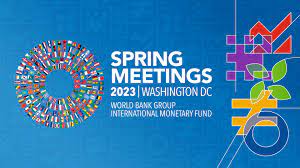IMF And WBG Spring Meetings 2023:

The International Monetary Fund (IMF) and World Bank Group (WBG) held their Spring Meetings in Washington DC, United States.
- The discussions focused on issues of international concern, such as the international debt crisis, rising inflation, climate and development, poverty eradication, and slowing economic growth.
IMF and WBG Spring Meetings 2023 Highlights:
- The Global Sovereign Debt Roundtable (GSDR), co-chaired by the IMF, WBG, and India as the Group of Twenty (G20) 2023 presidency.
- GSDR met with bilateral creditors (France — chair of the Paris Club, US, the United Kingdom, China, Saudi Arabia and Japan) and debtor countries (Ecuador, Suriname, Zambia, Sri Lanka, Ethiopia and Ghana) and Brazil as the forthcoming presidency of the G20 in 2024.
- Many developing countries are facing high debt burdens due to the pandemic, rising inflation, and the Russia-Ukraine war, which negatively impacts their ability to invest in climate mitigation and adaptation projects.
- There was a particular spotlight on African nations that have been disproportionately impacted by Covid-19 and the consequent economic downturn.
- GSDR discussed debt sustainability and ways to address debt restructuring challenges.
- ‘Debt Restructuring’ refers to the process by which countries, private companies or individuals can change the terms of their loans so that it is easier for the debtor to pay back the loan.
- The Vulnerable Twenty Group of Ministers of Finance (V20), representing 58 countries most systematically vulnerable to climate change impacts, highlighted the urgent need to transition to a global financial system that can deliver development-positive climate action for the most vulnerable.
- It addressed growing concerns about the climate crisis, covering topics such as climate finance, energy security, sustainable supply chains, and workforce readiness for green jobs.
- Access to timely concessional finance was identified as a major hurdle faced by climate-vulnerable nations, as their fiscal space is under pressure to address climate risks while facing debt distress and high cost of capital.




